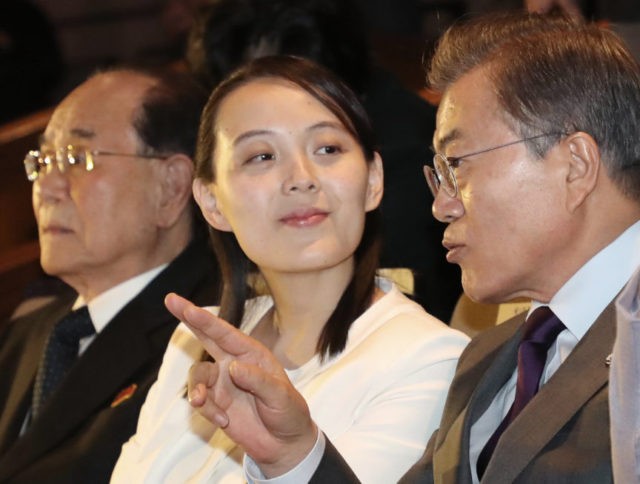It has been almost a half-century since the technology first made its appearance in 1969, but the Automated Teller Machine (ATM) has become a necessary part of life for people on the go in need of instant cash.
Today, use of the machine just about anywhere around the world is only limited by a single factor: one cannot take out more cash than one has deposited into one’s account. But, what if such were not the case? What if one were able to get instant cash out – totaling hundreds of millions of dollars – without ever having to make a single deposit? Sound impossible? Over the past several years, North Korea has done just that.
Pyongyang’s leadership has proven capable of using both the U.S. and South Korea as a personal ATM. It has proven successful in either obtaining millions of dollars in cash transferred to it directly or getting its capitalistic bankers to spend millions on its behalf — without having to put any skin into the game. As the Winter Olympics in South Korea came to a close on Sunday and the 500-member North Korean contingent (only 22 of whom were athletes) headed home, they left the bills for their 5-star hotel rooms and meals unpaid. Unsurprisingly, Seoul had agreed to foot the bill, estimated at $2.64 million.
It is ironic a country with the funding to build a nuclear arms arsenal and to develop a missile program is apparently hard-pressed to pay its own expenses at the Olympics, as every other nation did. The North Korean delegation stayed at luxury hotels. While each room held double occupants, such was not done by the North to hold down on costs but to hold each occupant responsible for ensuring the other did not defect.
Thus, South Korea had to allocate emergency funding of $2.7 million to cover the costs incurred by its northern neighbor. Effectively, this enabled Pyongyang to launch a charm offensive at the Olympics at its southern brother’s expense. Meanwhile, North Korean dictator Kim Jong-un — a man with all the charm of a rattlesnake — was left to plot his next move in developing his nuclear and missile program, confident his athletes and the dozens of cheerleaders he sent down were disarming anti-North critics with their smiles.
The U.S. and South Korea have only themselves to blame for serving as Pyongyang’s ATM. One or the other has been paying it extortion money for years. This is not the first time the North demanded money from the South to give the appearance change was taking place in the Hermit Kingdom.
In June 2000, there was great fanfare as a summit was scheduled between the two Koreas, the first meeting of their leaders since the Korean War, in Pyongyang. But Kim Jong-il, the father of the Kim Jong-un, demanded a cash payment be made up front. In fact, when a snafu resulted in the funds not being paid before the summit, it was temporarily delayed. While the summit raised hopes in the region of reconciliation, nothing was gained from it. The exact amount of the payment remains in question but a minimum of two hundred million dollars has been quoted, with a claim as much as one-half billion may have ultimately been transferred.
Knowing it had access to a cash machine in South Korea, North Korea’s leadership allowed its athletes at the 2000 Olympics in Sydney, Australia, to march with the South’s athletes. Kim Jong-il relished the cash cow summits became, later demanding as much as $10 billion from Seoul to hold one in 2009. This outlandish amount was never paid but was indicative of how much the North knew the South coveted such meetings for its own domestic political reasons. The North only needed to determine how much the South was willing to pay.
One thing the two Korean leaders agreed upon at the 2000 summit was that a second summit would be held. While it occurred in 2007, again in Pyongyang, Kim Jong-il again demanded a cash payment. Wanting to play down tensions with the North, South Korea met Pyongyang’s demands.
When it has come to what North Korea views as a non-necessity – such as Olympic expenses for its athletes and food shortages for its people – it has tended to rely on the goodwill of its enemies to cough up the money. Meanwhile, Pyongyang funnels money into its nuclear arms program. It is incredible that over the years, the U.S. and South Korea have provided the North with humanitarian aid at their own expense, saving North Korea from having to lay out its own cash. We effectively have been funding Pyongyang’s nuclear bullets — an arsenal with which it now threatens us and our regional allies.
Cash is the oil that keeps a terrorist engine finely tuned. It fueled the rise of the Islamic State and, with U.S. targeting of its cash reserves, led to that terrorist group’s eventual fall. Cash also has helped to keep the Kim dynasty in power in North Korea. Whether it is hundreds of millions of dollars paid for worthless summit meetings or two million dollars paid to cover North Korean athletes’ expenses for their meaningless participation in the Olympics, it all only serves to prolong the life of a brutal dictatorship. That fuel line must be permanently severed.
Lt. Colonel James G. Zumwalt, USMC (Ret.), is a retired Marine infantry officer who served in the Vietnam war, the U.S. invasion of Panama and the first Gulf war. He is the author of “Bare Feet, Iron Will–Stories from the Other Side of Vietnam’s Battlefields,” “Living the Juche Lie: North Korea’s Kim Dynasty” and “Doomsday: Iran–The Clock is Ticking.” He frequently writes on foreign policy and defense issues.

COMMENTS
Please let us know if you're having issues with commenting.